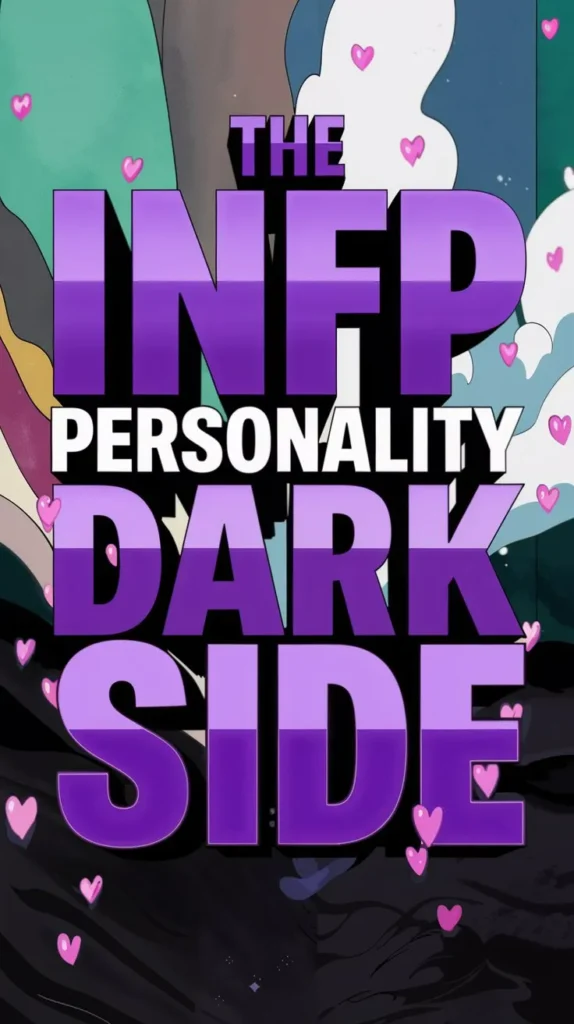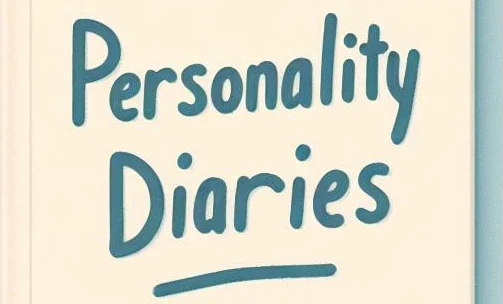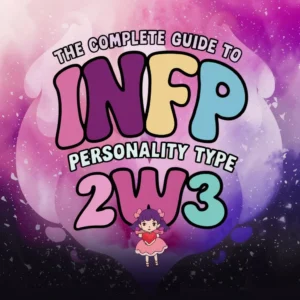As an INFP, you’re likely no stranger to the intense emotional highs and lows that come with being a deeply feeling individual. But have you ever stopped to ponder the darker aspects of your personality type?
The ones that can lead you down a path of emotional turmoil, self-destructive behaviors, and negative thought patterns?
It’s time to confront the side of yourself that you might not want to acknowledge – the one that’s prone to mood swings, anxiety, and feelings of being lost. What lies beneath the surface of your idealism, and how can you prevent these tendencies from taking control?
In a Nutshell

- INFPs’ intense empathy and idealism can lead to emotional turbulence, causing inner chaos and mood swings.
- Self-destructive patterns, such as self-blame and guilt, can emerge as a coping mechanism for emotional overwhelm.
- Negative thought patterns, including excessive self-criticism and self-doubt, can cripple an INFP’s confidence and decision-making.
- Unhealthy coping mechanisms, like escapism and avoidance, can hinder personal growth and relationships, leading to feelings of resentment and anxiety.
Turbulent Emotional Depths
As you plunge into the inner world of an INFP, you’ll often find turbulent emotional depths that can be overwhelming, even to themselves.
This emotional turbulence stems from their intense empathy and idealism, which can lead to inner chaos.
INFPs are naturally attuned to the emotions of those around them, making them susceptible to emotional contagion.
They can absorb and internalize the feelings of others, causing their own emotions to fluctuate wildly.
This inner chaos can manifest in various ways, such as intense mood swings, anxiety, or feelings of being lost and uncertain.
INFPs may struggle to articulate their emotions, leading to feelings of frustration and helplessness.
Their emotional landscape is a complex web of interconnected feelings, making it challenging for them to navigate and find balance.
As you explore further into the world of an INFP, understanding is crucial to approach their emotional turbulence with empathy and compassion.
Self-Destructive Tendencies
As you explore the darker aspects of your INFP personality, you may notice that you’re prone to self-destructive tendencies.
These patterns often emerge when you’re struggling to cope with emotional overwhelm, and they can manifest in various ways.
You may find yourself stuck in cycles of self-blame and guilt, or turning to unhealthy coping mechanisms that ultimately worsen your emotional state.
Emotional Overwhelm Triggers
When emotions reach a boiling point, INFPs are prone to self-destructive tendencies, often triggered by a sense of being overwhelmed by the sheer intensity of their feelings. This emotional overwhelm can be triggered by various factors, including fear responses and emotional contagion.
| Trigger | Description | Impact |
|---|---|---|
| Fear responses | You feel anxious or threatened by a situation, leading to a fight-or-flight response. | You become irritable, defensive, or withdrawn, causing self-destructive behaviors. |
| Emotional contagion | You absorb and internalize the emotions of those around you, making it difficult to distinguish between your feelings and others’. | You become overwhelmed by the emotional intensity, leading to feelings of hopelessness and despair. |
| Unmet expectations | You have high hopes or expectations that are not met, leading to feelings of disappointment and frustration. | You become critical of yourself and others, causing self-destructive patterns. |
| Social pressures | You feel forced to conform to societal norms or expectations, leading to feelings of suffocation and rebellion. | You engage in self-destructive behaviors as a way to cope with the pressure and maintain autonomy. |
As an INFP, crucially, you must recognize these emotional overwhelm triggers to prevent self-destructive tendencies. By acknowledging and addressing these triggers, you can develop healthier coping mechanisms and work towards emotional balance.
Self-Blame and Guilt
One of the most insidious self-destructive tendencies INFPs exhibit is a propensity for excessive self-blame and guilt, which can lead to a downward spiral of negative self-talk and self-criticism.
You may find yourself perpetually questioning your decisions, doubting your intentions, and second-guessing your actions.
This relentless self-scrutiny can be crippling, as you become mired in personal demons of inadequacy and failure.
As an INFP, you’re naturally attuned to moral accountability, always aiming to do the right thing.
However, this laudable trait can quickly turn toxic when you begin to internalize every misstep as a personal failing.
You start to believe that you’re inherently flawed, and that your mistakes are a reflection of your character.
This distorted thinking pattern can lead to a vicious cycle of self-blame, guilt, and shame.
It’s essential to recognize that this tendency isn’t a reflection of your worth as a person, but rather a misguided attempt to maintain control and order in your life.
Addictive Coping Mechanisms
You often turn to addictive coping mechanisms, such as substance abuse or compulsive behaviors, to temporarily escape the emotional turmoil sparked by your self-blame and guilt.
These destructive habits provide a fleeting sense of relief, but ultimately perpetuate a vicious cycle of self-destruction.
As an INFP, you may struggle to recognize the toxic escapes you’ve created, convincing yourself that they’re necessary to cope with the overwhelming emotions.
However, recognizing the importance of acknowledging that these addictive coping mechanisms are merely a band-aid on a deeper issue is vital.
Your tendency to self-blame and guilt-trip can lead you to seek solace in unhealthy habits, which can quickly spiral out of control.
It’s vital to confront the underlying emotional pain and develop healthier coping strategies.
By doing so, you can break free from the grip of addiction and begin to heal.
Remember, you’re not alone in this struggle, and seeking help is a sign of strength, not weakness.
Inner Critic Takes Over
Your inner critic takes over, hijacking your thoughts and emotions with a relentless barrage of self-doubt and negative self-talk.
It’s as if a constant voice in your head is whispering ‘you’re not good enough’ or ‘you’ll never succeed.’
These fearful thoughts can be overwhelming, making you question your abilities and second-guess your decisions.
You may find yourself stuck in a cycle of negative self-talk, where every mistake or setback is magnified, and every achievement is minimized.
As your inner critic gains momentum, it can be challenging to distinguish between constructive feedback and destructive criticism.
You may become overly critical of yourself, focusing on what went wrong rather than what went right.
This can lead to feelings of inadequacy, anxiety, and even depression.
Crucially, you must recognize when your inner critic is taking over and take steps to quiet its voice.
Overwhelming Sensitivity
As an INFP, you’re likely no stranger to feeling overwhelmed by the intensity of your emotions.
You’re prone to experiencing emotional overload syndrome, where the weight of your feelings becomes crushing.
This hypersensitivity can be exhausting, leaving you feeling like you’re constantly walking on emotional quicksand.
Emotional Overload Syndrome
During periods of intense emotional arousal, INFPs can experience Emotional Overload Syndrome, where their heightened sensitivity becomes overwhelming, leading to emotional exhaustion and impulsive reactions.
You may find yourself feeling drained, depleted, and utterly spent. This emotional exhaustion can be debilitating, making it challenging to muster the energy to tackle even the smallest tasks.
As you struggle to cope with the emotional turmoil, you may experience Information paralysis. You’re bombarded with so many thoughts, emotions, and stimuli that your mind becomes gridlocked.
Decision-making becomes an insurmountable task, and even the simplest choices feel like climbing a mountain. You may feel like you’re drowning in a sea of emotions, with no lifeline in sight.
In this state, it’s crucial to recognize the signs of Emotional Overload Syndrome and take proactive steps to manage your emotions.
Feeling Everything Deeply
As an INFP, you’re no stranger to feeling everything deeply.
INFPs’ intense emotional sensitivity allows them to feel everything deeply, making them highly attuned to the emotional currents surrounding them, but also prone to being overwhelmed by the sheer intensity of their emotions.
This intense emotionalization can be both a blessing and a curse.
On one hand, it enables you to empathize with others on a profound level, making you an exceptional listener and friend.
On the other hand, it can lead to empathetic exhaustion, where you become drained from absorbing the emotions of those around you.
You might find yourself internalizing others’ feelings, taking on their emotional burdens, and struggling to differentiate between their emotions and your own.
This overwhelming sensitivity can be debilitating, leaving you feeling like an emotional sponge, perpetually drained and depleted.
Crucial to recognize the signs of emotional overload and take proactive steps to protect your emotional well-being.
Unbridled Idealism
As an INFP, you’re likely no stranger to idealism. But beware: one of the most significant pitfalls of being an INFP is that your idealism can quickly spiral out of control, leading to unrealistic expectations and a distorted view of reality.
When left unchecked, your idealism can manifest in unhealthy ways, such as:
Unrealistic standards: You may set impossibly high standards for yourself and others, leading to disappointment and frustration when reality fails to live up to your expectations.
Romantic fantasies: You might idealize romantic relationships, expecting them to be perfect and fairy-tale-like, which can lead to disappointment and heartache when they don’t meet your lofty expectations.
Unattainable goals: Your idealism can drive you to set unattainable goals, which can lead to feelings of inadequacy and burnout when you’re unable to achieve them.
It’s essential to recognize when your idealism is getting the better of you and take steps to ground yourself in reality. By doing so, you can avoid the pitfalls of unbridled idealism and cultivate a more balanced, realistic approach to life.
Passive-Aggressive Behavior
Your tendency to avoid conflict and preserve harmony can sometimes lead you to exhibit passive-aggressive behavior, indirectly expressing negative feelings or resentment through subtle actions or comments.
This can manifest in various ways, such as giving someone the silent treatment or making backhanded compliments that undermine their confidence. You might think you’re avoiding conflict, but in reality, you’re creating tension and misunderstanding.
You may justify your behavior by telling yourself that you’re being kind or considerate, but deep down, you’re actually expressing frustration or anger. This can be confusing for others, who may sense that something is wrong but can’t quite put their finger on it.
Passive-aggressive behavior can damage relationships and erode trust, as others may feel manipulated or disrespected.
It’s essential to recognize when you’re slipping into passive-aggressive patterns and take steps to address the underlying issues. By being more direct and honest about your feelings, you can build stronger, more authentic relationships and maintain the harmony you value.
Escapism and Avoidance
In your efforts to maintain harmony, you may also turn to escapism and avoidance as a way to sidestep conflict or uncomfortable emotions, temporarily distracting yourself from the issue rather than confronting it head-on.
You might retreat into a fantasy world, immersing yourself in books, movies, or video games to escape the discomfort of reality. This coping mechanism can provide temporary relief, but it doesn’t address the underlying problems.
Procrastination is a common avoidance tactic, where you put off difficult conversations or tasks to avoid feelings of anxiety or guilt.
Denial involves downplaying or ignoring the issue altogether, hoping it will resolve itself.
Displacement is another tactic, where you redirect your emotions towards a safer, less threatening target, such as complaining about a minor issue instead of confronting the real problem.
While these strategies might provide temporary relief, they can ultimately hinder personal growth and relationships. By recognizing these patterns, you can begin to confront your fears and insecurities, rather than escaping into a fantasy world.
Unhealthy People-Pleasing
By consistently prioritizing others’ needs over your own, you may find yourself trapped in a pattern of unhealthy people-pleasing. You say yes to every request, even when it drains your energy and goes against your values.
This fearful compliance stems from a deep-seated need for approval and validation. You’re afraid that if you don’t comply, others will reject or abandon you.
As a result, you become overwhelmed and exhausted, experiencing social exhaustion from constantly putting others first. You may feel like you’re living someone else’s life, rather than your own. Unhealthy people-pleasing can lead to resentment, anxiety, and depression. You start to lose touch with your own desires, values, and boundaries.
It’s essential to recognize the signs of unhealthy people-pleasing and take steps to break free from this pattern. Start by saying no to requests that don’t align with your values or drain your energy.
Practice self-care and prioritize your own needs. Remember, taking care of yourself isn’t selfish – it’s necessary for your well-being and ability to maintain genuine, healthy relationships.
Melancholic Pessimism
Dark clouds of melancholy often gather in your mind, casting a shadow over your outlook and fueling a pessimistic worldview.
As an INFP, you may find yourself prone to dark introspection, where your thoughts spiral into a vortex of negativity and despair.
This gloomy outlook can be overwhelming, making it difficult to shake off feelings of hopelessness and desperation.
- Catastrophizing: You may find yourself jumping to the worst-case scenario, assuming that every situation will end in disaster.
- Ruminating on past failures: You might get stuck replaying past mistakes, reliving the pain and disappointment, and using them as evidence that you’re not good enough.
- Forecasting doom: You may predict a bleak future, where everything will go wrong, and you’ll be left with nothing but despair.
Frequently Asked Questions
Can INFPS Be Naturally Manipulative or Is It a Learned Behavior?
You might wonder if INFPS are naturally manipulative; research suggests it’s often a learned behavior, developed as a coping mechanism to navigate complex power dynamics and master manipulation tactics to achieve their idealistic goals.
Why Do INFPS Attract Toxic People and Relationships?
You attract toxic people and relationships because your emotional vulnerability and tendency to idealize partners create an environment where others can take advantage of your good nature, making it essential to set healthy boundaries.
Do INFPS Struggle With Anger Management or Is It Suppressed?
You may struggle to express anger, as INFPs tend to internalize emotions, leading to emotional repression. However, certain anger triggers can cause a sudden, intense outburst, revealing the depth of your suppressed emotions.
Can INFPS Be Narcissistic or Is It a Contradictory Trait?
You might wonder if INFPs can be narcissistic, but it’s unlikely, as their empathetic nature contradicts self-absorption and egotistical tendencies. While they may have moments of self-focus, it’s often rooted in idealism, not a desire for admiration or power.
Are INFPS More Prone to Addiction Due to Their Emotional Nature?
You may struggle with addiction due to your emotional nature, as you often rely on escapism mechanisms to cope with overwhelming feelings, making it vital to develop healthy emotional regulation strategies to avoid unhealthy dependencies.










James Green is a seasoned psychologist specializing in narcissism and other personality and relationship issues. With a passion for helping others understand and navigate their own personality traits and relationships, James shares his insights and expertise on his blog, Personality Diaries. Connect with him on Pinterest and Instagram for regular updates and insights.











